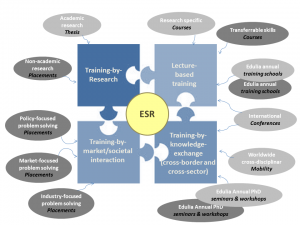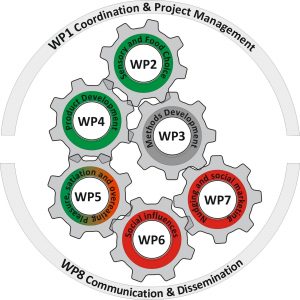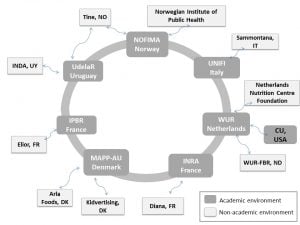About
The project
Edulia responds to the urgent need of the EU society to find new ways to tackle the escalating issue of obesity, through promoting healthier eating from childhood, within the context of choice. Based on the relations between sensory perception, pleasure, food choice and food behaviour, the project will look for new approaches to drive children to like and actively choose healthy foods, developing healthier dietary habits. Edulia is a multi-disciplinary and inter-sectorial European Training and Research Network with a global reach. Our network will train 11 young innovative and adaptable researchers in high-level skills across complementary fields through studying children’s food choices
The overall aim of the research programme is to better understand how multiple factors act as barriers for children’s healthy eating and how to tackle them, bringing together leading scientists in the Food Choice arena.
Edulia will go further than the classical approach of “teaching children what is healthy”, by exploring social marketing and nudging strategies, study peer and family social interactions and social media marketing, identify sensory and non-sensory parameters that influence what is eaten (food choice) and how much is eaten (intake), and develop products which can drive healthy eating through sensory pleasure.
Read about Edulia in CORDIS here
Training network
Edulia will address the question of how to balance food pleasure and nutritional needs for children in a changing society? Edulia’s approach will cover the main determinants of preferences, bringing together leading scientists in the children’s Food Choice arena, devoted to the training of eleven early stage researchers (ESRs) who will become experts at the interface of the following complementary fields: Food Science, Sensory Science and Perception, Sensometrics, Human Nutrition, Consumer Behaviour, Eating Behaviour, Social Marketing, Food Socialization, Psychology, Cognitive Science and Neurosciences.
Edulia’s training program will be structured based on the MSCA philosophy that ITNs should “shape future generations of entrepreneurial researchers capable of contributing effectively to the knowledge-based economy and society”. Once recruited, a personalised career development plan will be developed with each ESR, setting a timetable, and indicating needs and opportunities.
Specific research training needs and complementary skills will be detailed in each plan, taking into consideration the background of each ESR.The overall training programme of Edulia is designed to make the best use of the expertise and training facilities available in the network and host institutions. Wherever possible, external training opportunities are planned to maximise the benefits of mobility. The training structure for all the ESRs will include four areas balancing academic and non-academic training

Work packages
WP1 and 8 are the enabling WPs throughout the project life. Project coordination, management, supervision and financial administration will be managed in WP1. In WP8, communication and dissemination of the project will be organized.
In WP2 to WP7 (research and training) children’s food choices will be studied, focused on the main determinants of preferences. The interaction amongst WP2-WP7 is not linear in time, but designed as a “clockwork”, in which the different WPs are gears moving together in continuous feedback, maximizing the interactions. The different WPs are described here

Partners
Edulia comprises seven beneficiaries: four universities (University of Firenze, Wageningen University, MAPP-Aarhus University, Universidad de la República) and three research institutes (Nofima; INRA Dijon; Institut Paul Bocuse Research Centre). The beneficiaries will liaise with local non-academic partners from different sectors: industry (Tine, Arla, Elior, Samontana and Diana), applied research (Food & Biobased Research-WUR-FBR), marketing (Kidverising), and the public sector (Norwegian Institute of Public Health, Netherlands Nutrition Centre Foundation-NC, National Food Institute of Uruguay-INDA).


